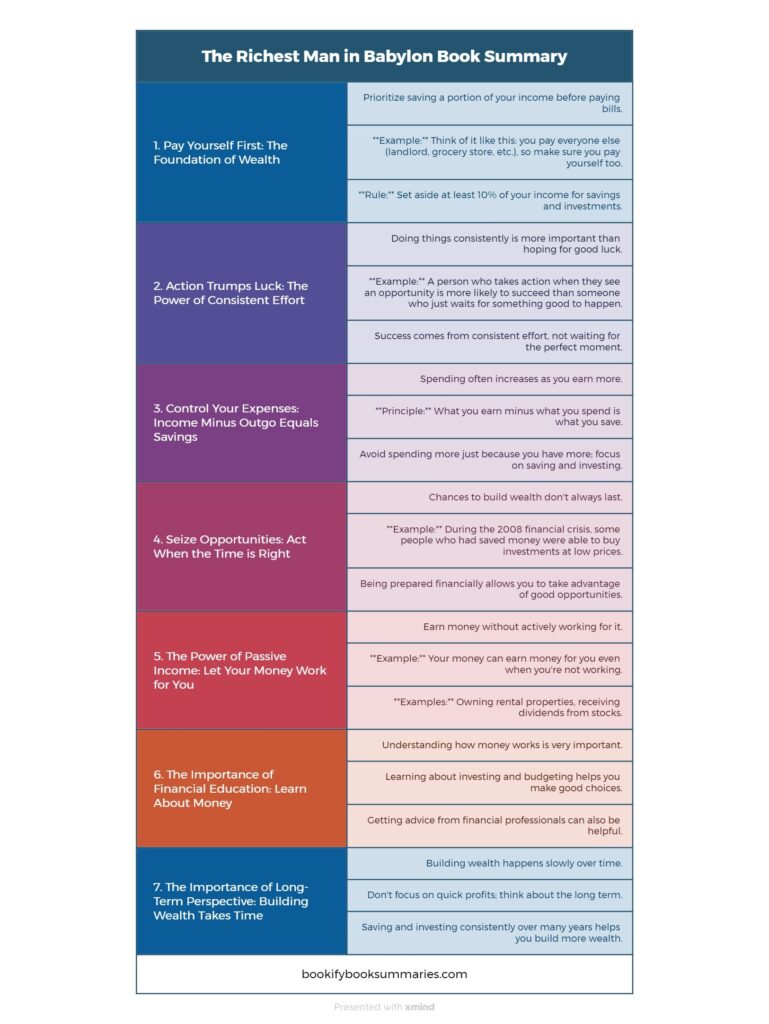
George S. Clason’s “The Richest Man in Babylon” is a timeless classic that offers profound financial wisdom through engaging parables. This book, originally published in the 1920s, remains remarkably relevant today, providing timeless principles for building wealth and achieving financial freedom.
Story in the Book
The Richest Man in Babylon tells the story of Arkad, a poor scribe who becomes the wealthiest man in ancient Babylon. Arkad’s journey begins when a wealthy moneylender, Algamish, visits him and offers financial advice in exchange for completing a task. Algamish teaches Arkad the importance of saving a portion of his income, controlling expenses, and investing wisely. Arkad follows these lessons diligently and gradually builds his wealth.
Years later, Arkad’s friends, Bansir and Kobbi, seek his advice because they are struggling financially despite working hard. Arkad explains the principles that helped him succeed, like saving 10% of his income, avoiding unnecessary expenses, and making his money work through investments. Throughout the book, other stories set in Babylon teach similar lessons, such as the importance of seeking financial education, avoiding risky ventures, and having patience in building wealth.
1. Pay Yourself First: The Foundation of Wealth
The cornerstone of financial success lies in prioritizing savings. Clason emphasizes the importance of “paying yourself first” by setting aside a portion of your income before any other expenses. This disciplined approach ensures that you consistently build wealth, even during challenging times.
- The Analogy: Imagine your income as your earnings. You pay your landlord, the grocer, the tailor – everyone else – but yourself. This is akin to working for others while neglecting your own financial well-being.
- The Rule: Dedicate a portion of your income, ideally 10%, to savings and investments before any other expenses. This ensures you consistently build wealth and create a financial safety net.
2. Action Trumps Luck: The Power of Consistent Effort
While luck plays a role in success, consistent action is the true driver. Clason highlights that successful individuals are not necessarily luckier; they simply take more action.
- The Procrastinator vs. The Doer: Faced with opportunities, the procrastinator makes excuses, while the doer takes action. The doer increases their chances of success by actively pursuing opportunities and learning from their experiences.
- The Key: Success is not about waiting for the perfect moment or hoping for a lucky break. It’s about consistently taking action, embracing challenges, and learning from both successes and failures.
3. Control Your Expenses: The Law of Income Minus Outgo Equals Savings
Clason emphasizes that expenses tend to rise to meet income. If you receive a raise, your spending often increases accordingly. This “lifestyle creep” can hinder wealth accumulation.
- The Principle: “Income minus outgo equals savings.” This fundamental equation highlights the importance of controlling expenses.
- The Danger of Lifestyle Inflation: Increasing your spending with every income increase can trap you in a cycle of debt and prevent you from building significant wealth.
- The Solution: Practice mindful spending, identify areas where you can cut back, and prioritize saving and investing.
4. Seize Opportunities: Act When the Time is Right
Opportunities for wealth creation are often fleeting. Clason emphasizes the importance of recognizing and seizing these opportunities when they arise.
- The 2008 Financial Crisis: The financial crisis of 2008 presented an opportunity for those who were financially prepared. By increasing savings and investing during the market downturn, they were able to capitalize on the subsequent recovery.
- The Importance of Preparedness: Being financially prepared allows you to capitalize on unexpected opportunities. This may involve cutting back on expenses, increasing savings, and diversifying your investments.
5. The Power of Passive Income: Let Your Money Work for You
Clason introduces the concept of passive income, where your money works for you while you sleep.
- The Analogy: “Your money will work for you while you go to class, while you’re hanging out at the gym, and even while you’re sleeping.”
- Building Wealth Exponentially: By investing wisely, your money can generate returns that compound over time, leading to significant wealth growth.
- Examples of Passive Income: Rental properties, dividend-paying stocks, and other income-generating assets.
6. The Importance of Financial Education: Become Your Own Financial Advisor
“The Richest Man in Babylon” emphasizes the importance of financial education. By understanding basic financial principles, you can make informed decisions and avoid common pitfalls.
- The Value of Knowledge: Learning about investing, budgeting, and personal finance empowers you to take control of your financial future.
- Seeking Guidance: While self-education is crucial, seeking guidance from financial advisors can provide valuable insights and support.
7. The Importance of Long-Term Perspective: Building Wealth Takes Time
Building wealth is a marathon, not a sprint. It requires patience, discipline, and a long-term perspective.
- Avoid Short-Term Thinking: Focus on long-term goals and avoid making impulsive financial decisions based on short-term market fluctuations.
- Consistency is Key: Consistent saving and investing over time will compound and lead to significant wealth accumulation.
Conclusion
“The Richest Man in Babylon” offers timeless wisdom that remains relevant in today’s complex financial world. By embracing the principles of paying yourself first, taking action, controlling expenses, seizing opportunities, leveraging passive income, seeking financial education, and maintaining a long-term perspective, you can lay the foundation for a secure and prosperous financial future.
Read more about Finance Here
